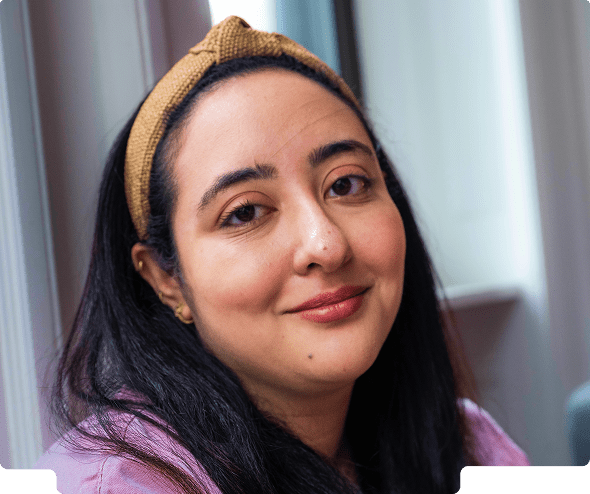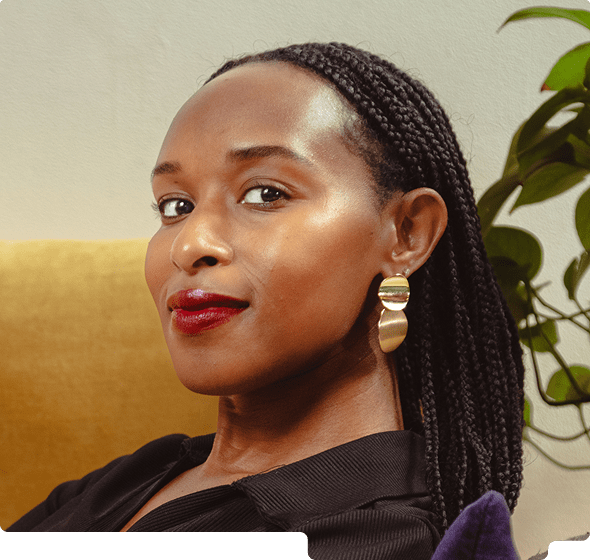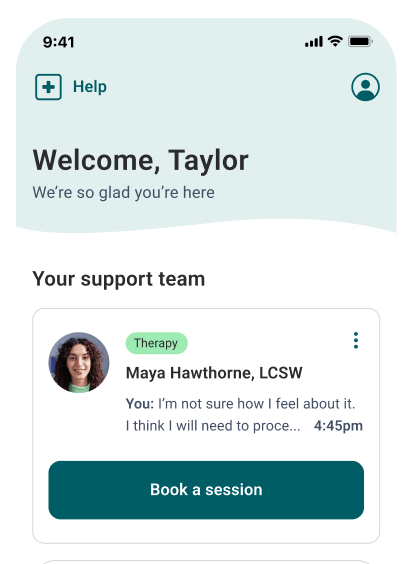Online therapy with a licensed therapist
- No wait lists
- Match with a therapist today
- Most insured members have a $0 copay

Most insured members have a $0 copay
Choose your insurer to learn more:
Benefits of Talkspace

Eliminate commute time and scheduling hassles

No search for a therapist or long wait for an appointment

Seamlessly switch providers, at no extra cost

Receive affordable, high-quality mental health care
Here’s how it works
Meet the Talkspace licensed providers
Our network of therapists and psychiatric providers have specialization in 150+ conditions, treatment approaches, and mental health needs.


Find a licensed therapist near you
What members say about Talkspace
More than 60,000
5-star reviews
Read why people love using Talkspace.
See all reviews
Any questions?
Find trust-worthy answers on all things mental health at Talkspace.

Is online therapy effective?
Online therapy is proven to be as effective, if not more effective than face-to-face therapy. A study conducted by Talkspace & the Journal of Telemedicine and e-Health showed that text-based therapy through Talkspace was highly effective and comparable to traditional therapy. When compared with traditional therapy, Talkspace also generated greater satisfaction in terms of its delivery, accessibility, and affordability. Learn more from studies on how Talkspace improves mental health.
What should I expect during online therapy sessions?
Unlike traditional therapy, online therapy sessions can take place in a few different ways: via text, audio, or video. Video therapy sessions are the most similar to in-person therapy in that you’ll meet face-to-face with your therapist. Text & audio methods are asynchronous; you’ll be able to send text messages, audio and video clips to your therapist any time and your therapist will respond daily, 5 days/week. There’s no limit to how many messages you send, and you can review old messages to track your progress and reflect on your insights and discoveries.
You can expect to spend some time in your initial online therapy session discussing your goals for therapy, along with any concerns or issues you’re hoping to address. The therapist will guide the discussion by asking questions that help them gain a better understanding of your situation. The therapist may tell you about their professional background and approaches to mental health care. This is a great time to ask the therapist questions to help determine if they’re the right fit for you. The initial therapy session is a chance for the therapist and the client to get to know one another and build a rapport.
In ongoing sessions, the structure will vary depending on your goals, preferences, and progress. Your online therapist will provide helpful guidance and exercises to help you work toward your goals. Often, they’ll ask deeper questions to help you see a problem in a new light. Throughout your treatment, they’ll check in to make sure there’s room for anything new that you’d like to work on… read more
How much does therapy cost?
As you can imagine, because counseling can be so impactful and therapists can do so much to improve the specific challenges clients struggle with, the service is not without costs. Therapists are highly trained professionals — licensed in the state they practice in, each with a master’s degree and an additional 3,000 hours of supervised work. They deserved to be justly compensated! Talkspace also requires six-weeks of training and onboarding for the platform.
The relatively high costs of therapy and healthcare more generally do make it prohibitively expensive for many. That’s why, at Talkspace, we aim to make counseling more accessible by keeping costs low — we believe in therapy for all. Often costs vary by region, but in-person therapy costs on average $75-150 per hour (in places like New York it is generally between $200-300 per hour) and the majority of therapists do not take health insurance.
Online therapy, however, is a most cost effective and affordable option for those who need access to care, but don’t have the means to access brick-and-mortar counseling.
How much does online therapy cost?
Online therapy has been proven to have the same efficacy as in-office therapy and is typically much more affordable (often less than half the cost of traditional therapy). This is mostly due to the fact that online counseling requires less overhead than therapists who work in an office.
You can use an online therapy network, like Talkspace, to find a therapist or check if a therapist you know will provide online service.
Cost-saving options
Therapy can be lifesaving for those who struggle with mental health challenges — everyone should have access to it. But for those whom counseling proves too cost prohibitive, there are a few options that can help defray the expense.
Below are some affordable examples of ways to find the mental healthcare you need:
- Ask the Therapist for a Discount or Seek Therapists With Sliding Scales
Most therapists are not in it for the money. Though therapists need to be able to make a living, if you tell them you can only afford a discounted rate, they may oblige. There are also therapists who use sliding scales for all payments. Before sessions begin, check for this information on their website, therapy network, or profile. - Schools or universities
If you’re a student and want free or discounted therapy, ask your student health center for more information. Student health centers can often provide low-cost or free mental health services on a short-term basis (a semester or quarter) — a good temporary solution until you find a long-term therapist you can afford. - Therapy practices
Therapy practices — sometimes called agencies or firms — are often more affordable because more than one person is chipping in for the cost of rent and other overhead. These practices often have interns — those who are working on their supervised clinical hours — who charge less. If you prefer in-office counseling, practices are often a more affordable option. - Not using insurance
Many assume that using insurance for therapy will lower the overall cost. However, circumventing insurance providers is sometimes the cheaper option. Many therapists choose not to accept insurance coverage because payments are often lower and there is a great deal of paperwork for reimbursements. - Federally-funded health centers
Federally qualified health centers (FQHCs) usually have mental health resources and the law requires they offer a sliding payment scale. You can search for one in your area.
While therapy can be expensive, it’s important to remember that your mental health touches every aspect of your life — your relationships, career, and happiness. Gambling with your mental health is not something that will pay off long-term. It’s important to prioritize your well-being!
What are common types of therapy?
All forms of psychotherapy exist to improve clients’ mental health, but there are styles of therapy specific to issues clients face, as well as different therapeutic approaches, represented by different schools of thought around treating mental health and the nature of the mind. Some schools are more closely related to the older styles of counseling developed by early psychoanalysts like Sigmund Freud, while others are more contemporary and reflect newer research by theorists.
A few of the most popular popular types of therapy include:
Cognitive Behavioral Therapy (CBT)
Challenges negative client-thought patterns about themselves and the world to alter unwanted behaviors or treat disorders such as depression. CBT provides relatively short-term treatment for a range of conditions, phobias, disorders and is backed by a great deal of research on its effectiveness.
Client-Centered Therapy
Focuses on the client, who helps determine the course of the session; the therapist offers a high-degree of empathy, helps build self-esteem and problem-solving abilities, but does not overtly guide the session.
Dialectical Behavior Therapy (DBT)
Stresses acceptance and change while teaching behavioral skills (mindfulness, distress tolerance, interpersonal effectiveness, emotion regulation) that help clients enhance motivation. DBT is often used to treat more severe mental health issues including PTSD, borderline personality disorder, self-harming, and eating disorders.
Existential Therapy
Derived from existential philosophy, this modality emphasizes self-actualization in the face of the realities of the human experience, including our isolation from one another and mortality. Existential therapy helps clients face these difficult and overwhelming truths.
Gestalt Therapy
Stresses the client-therapist relationship and their therapeutic alliance to highlight personal responsibility and a focus on the present. Often gestalt therapy invokes role playing to resolve conflicts from the client’s past.
Psychodynamic Therapy
Explores a client’s unconscious feelings/thoughts and how the present is impacted by the past. Psychodynamic therapy is the oldest form of psychotherapy and is, in fact, an outgrowth of psychoanalytic therapy developed by Freud where clients are encouraged to speak extemporaneously on whatever comes to mind, whether it be fears, dreams, or desires.
What does a therapist do?
A therapist, or psychotherapist, is a licensed mental health professional who helps clients improve the lives of their clients, helping them develop better cognitive and emotional skills, reduce the symptoms of mental illness and cope with various day-to-day challenges. Therapists primarily help clients, whether via in-person or online therapy, improve their mental health. Some therapists work in a research capacity or in an academic setting.
Therapists work in a range of modes and capacities. They help their clients cope with whatever they’re struggling with and assist in modifying behaviors that may be unhealthy, maladaptive, or harmful. Therapists also teach better coping skills.
Whatever type of counseling you engage in you can be sure that your therapist will:
- Listen with empathy and understanding
- Analyze past and present events to help clients better understand behaviors
- Comfort clients when they undergo misfortune
- Provide a third-party unbiased opinion
- Teach emotional, cognitive, and communication skills
- Guide clients through stressors and anxieties
- Provide non-directive advice
- Help provide assessment and diagnosis of mental health conditions
Therapists themselves do not prescribe medication, but they refer clients to psychiatrists, mental health facilities, or other medical professionals as needed.
How long does therapy take?
The length of the therapeutic process is dependent upon your individual needs, goals, and challenges. The number of recommended sessions varies by condition and treatment type, which is something you can discuss in an initial consultation with a therapist. Many clients with depression and anxiety report feeling better after three months.
Those who are treated via cognitive behavioral therapy report feeling better around 10-20 sessions, Talkspace therapist Cynthia Catchings explains. She reports that she’s had “many successful stories with clients who had situational issues that only needed brief therapy services” in order to start feeling better. She adds, “it is important to mention that therapy is not only a way to solve a problem, but also a way of living. In the same way that we go to the gym and exercise or tone our body, therapy is like exercise for our mind, heart, and soul.”
Whatever your therapeutic process may look like, remember to trust your gut and express any concerns to your therapist. Honesty and transparency will ensure you’re on the right path to feeling better as soon as possible.
How do you know if therapy is working?
While everyone’s therapeutic process is different, there are some common signs you’re making progress in therapy.
If you sought counseling for a mental health condition, symptom improvement is a main indicator that therapy is working for you. Other indicators of improvement include progress toward long-term goals — you’ve moved past venting and have started working toward change — or recognizing the development of new skills, coping mechanisms, or better habits and ways of thinking.
And remember, if you’re concerned about the progress you’re making in counseling, express these worries to your therapist.
Why would online counseling be more popular than traditional counseling?
Online counseling is proven to be as effective, if not more effective than face-to-face counseling, with important benefits that bring the experience into the modern era. For some, traditional counseling is their choice because they haven’t yet experienced the freedom that online counseling offers.
If you’re on the fence about whether online counseling is right for you, consider these positive benefits… read more
How do you find the best online therapy for your needs?
The best online therapy services provide convenient, affordable ways to receive mental health support. They offer clients an opportunity to connect with reputable, licensed therapists in a flexible and accessible scheduling environment, as well as offering up varied options for communication.
While the best online therapy option may vary from person to person, Talkspace’s mental health platform offers a few standout features that make effective treatment and better overall mental health outcomes accessible to all:
- Insurance: Talkspace is one of the only online therapy platforms that accepts insurance. We currently accept insurance from Cigna, Optum, Gatorcare, Aetna, and more. You can view our full partner list here.
- Holistic treatment: In addition to providing affordable online therapy, Talkspace offers telehealth psychiatry & medication management services. This means that we’re able to provide more personalized treatment plans, as psychiatric evaluations and medication management can be integrated with therapy sessions.
- Unlimited messaging: Our Unlimited Messaging Therapy™ means you can message your therapist via text, video or voice at any time, from anywhere.
How do you find the right therapist?
As a prospective client, it’s great to share what your preferences are and what you’re looking to get out of therapy. In fact, it’s critical to success in therapy! The intake process — where you answer some questions about what’s brought you to counseling or what challenges you’re dealing with — is a great opportunity for clients to be up front about what they need from a therapist.
What to look for in a therapist
While by definition therapists are unbiased advocates, forming a real and trusting bond with your therapist is the most important element of selecting the right fit. Here are some aspects to consider when deciding on a therapist:
- Age
Do you prefer a therapist who is younger or older than you? Someone who has the experience of many years as a therapist or someone younger who can perhaps relate to your lifestyle in a more authentic way. - Race/Ethnicity
Would you prefer having a therapist of the same ethnicity, who makes you feel more comfortable and understood — having a shared understanding and not having to explain your experience of the world, including microaggressions and more direct racism, prejudice, and oppression? - Gender/sexuality
Do you prefer a therapist of the same gender or sexuality, who can better relate to your experience in relationships, career, and your experience with your family? - Specialty
Would you prefer a therapist who has expertise in a specific area or specializes in specific challenges like trauma or eating disorders? Or would you prefer a generalist who deals with all kinds of issues? - Religion
Do you prefer a therapist who shares your religious beliefs or is a shared faith less important for the issues you’re working on.
At Talkspace, we provide individual therapy services as well as specialized mental health care around:
- Couples therapy and marriage counseling - address any relationship issue with the help of a licensed therapist
- LGBTQIA+ therapy - meet with an online therapist who identifies as LGBTQIA+ or has worked with LGBTQIA+ clients
- Online therapy for veterans - receive support for mental health conditions like anxiety, depression, or PTSD
- Teen counseling - online therapy options for teens aged 13-17
On a platform like Talkspace, you can find a therapist that fits your precise needs. And if you don’t connect with your therapist, it’s easy to switch to another with no-hassle, and at no additional cost. Finding the right therapist is essential and, with Talkspace, you don’t have to spend time searching, making appointments, and auditioning therapists — the perfect fit is just a click away.
What are the benefits of therapy?
Therapy can benefit everyone, but it isn’t solely beneficial after a traumatic experience, abuse, anxiety, or a major life change — it can help in everyday life, too! Many highly successful people use therapy to be more productive in goal setting and self-acceptance.
Ways therapy can help
Nearly all aspects of life can be impacted and improved with psychotherapy. A therapist may provide new techniques for problem solving, help challenge irrational habits and incorrect assumptions, help reframe long-held views, or or assign homework to help you grow and change. A therapist can also help overcome mental health conditions like depression, anxiety, body image issues, and even addiction.
Primarily a therapist will help to:
- Understand your feelings
Learn what emotions are common for a condition or circumstances. - Get immediate support
While deep-seated issues can be addressed down the line, counseling can benefit you in situations where you need help urgently. - Plan your future
Therapists can help create a game plan and set goals for the future in a safe environment and keep you accountable. - Relieve the pressure with a therapeutic relationship
Often, simply getting things off your chest in a safe space can be healing. If serious problems arise again, the on-going therapeutic relationship will keep you strong.
The most important thing is that a therapist is always there for you. They’re an impartial ally who will support you without judgment. While your friends might not text you back, your therapist is always willing to listen.
What are the most convenient features of online therapy?
As an online therapy service, Talkspace represents a major breakthrough in modern psychology: using technology to improve individual and couples therapy. This use of technology is also known as “telemedicine,” and is part of a growing shift in the healthcare industry, with technology enabling more convenient, affordable, and on-demand benefits.
We’d like to give you a brief tour of the cool benefits Talkspace offers as part of the online therapy experience… read more
Does insurance cover online therapy?
Typically, yes. Many people are able to get therapy covered by insurance through an employer’s healthcare plan or medical assistance programs such as Medicare & Medicaid. Learn more about insurance coverage for therapy.
Does Talkspace accept insurance?
Yes, Talkspace accepts insurance for mental health care and therapy services. We’re in-network with most major insurers (including Cigna, Optum, Medicare, TRICARE, Anthem, Gatorcare, Aetna, and more) and make it easy for out-of-network members to get reimbursed, making therapy more affordable than ever. On average, in-network insured members pay a $15 copay or less. You can view our full partner list here.
Even if you don't have a health insurance plan that covers mental health services, Talkspace is still more affordable than most co-pays for in-person providers. You can also pay with an FSA/HSA card, if you have one, or take advantage of your employee assistance program (EAP). Many employers offer EAP benefits to help employees access therapy and counseling services at very low to no cost. Check with your human resources department for more information on telehealth coverage.































